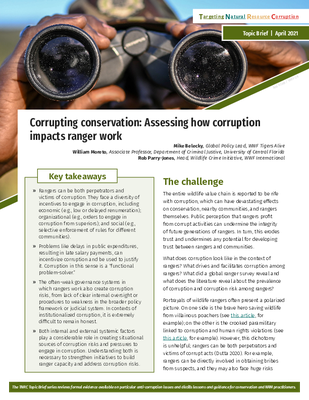Corrupting Conservation: Assessing How Corruption Impacts Ranger Work

The entire wildlife value chain is reported to be rife with corruption, which can have devastating effects on conservation, nearby communities, and rangers themselves.
Public perception that rangers profit from corrupt activities can undermine the integrity of future generations of rangers. In turn, this erodes trust and undermines any potential for developing trust between rangers and communities. This brief examines the issue of ranger corruption, drawing on data from a recent global study led by WWF and the University of Central Florida as well as other available literature.
Key Takeaways:
- Rangers can be both perpetrators and victims of corruption. They face a diversity of incentives to engage in corruption, including economic (e.g., low or delayed renumeration); organizational (e.g., orders to engage in corruption from superiors); and social (e.g., selective enforcement of rules for different communities).
- Problems like delays in public expenditures, resulting in late salary payments, can incentivize corruption and be used to justify it. Corruption in this sense is a “functional problem-solver.”
- The often-weak governance systems in which rangers work also create corruption risks, from lack of clear internal oversight or procedures to weakness in the broader policy framework or judicial system. In contexts of institutionalized corruption, it is extremely difficult to remain honest.
- Both internal and external systemic factors play a considerable role in creating situational sources of corruption risks and pressures to engage in corruption. Understanding both is necessary to strengthen initiatives to build ranger capacity and address corruption risks.


